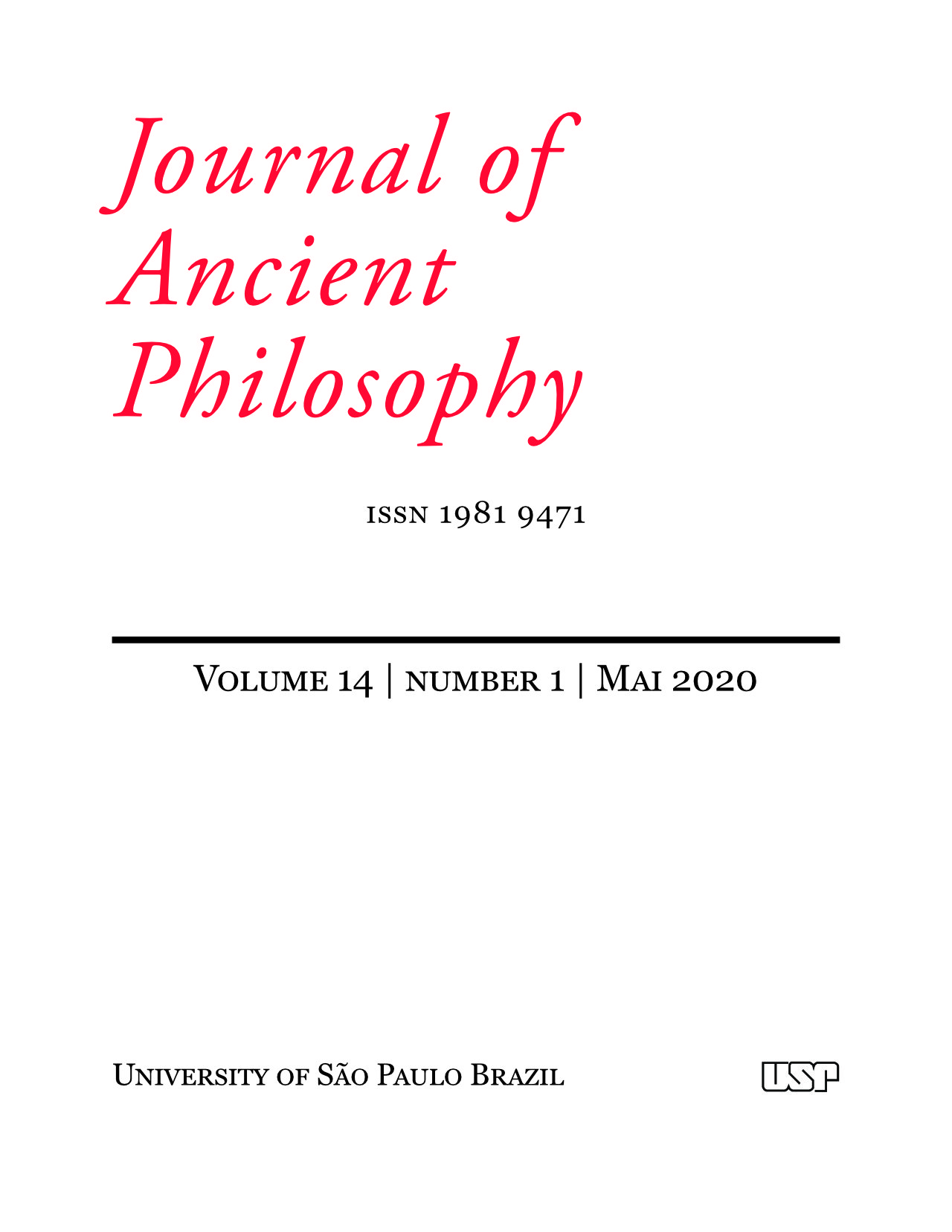Divinity, Noēsis, and Aristotelian Friendship
DOI:
https://doi.org/10.11606/issn.1981-9471.v14i1p01-29Palavras-chave:
friendship, Aristotle, divinityResumo
Aristotle's NE X claim that the best human life is one devoted to contemplation (theoria) seems in tension with his emphasis elsewhere on our essentially political nature, and more specifically, his claim that friendship is necessary for our flourishing. For, if our good can be in principle realized apart from the human community, there seems little reason to suggest we 'need' friends, as he clearly does in NE VIII & IX. I argue that central to Aristotle's NE X discussion of contemplation is the claim that our chief good accords with whatever is 'most divine' in us, viz. our rational nature (NE 1177b2-18). Thus, the best human life involves the excellent exercise of our rational capacities. I distinguish two ways in which human beings flourish through exercising their rationality. The first is in the activity of theoria. The second, I argue, can be found in the virtuous activity of complete friendship (teleia philia). For Aristotle the truest form of friendship is an expression of rationality. It is characterized not merely by our living together, but conversing, and sharing one another's thoughts (NE 1170b12-14). Examining Aristotle's notion of a friend as 'another self (alios autos), I argue that through friendship human beings come to better know themselves and the world in which they live. Complete friendship involves a (uniquely human) second-order awareness of oneself in another, and through this awareness our understanding of ourselves and the world in which we live is enriched, confirmed, and enjoyed through the presence of other minds. Thus, the highest form of Aristotelian friendship is an intellectual activity through which we attain an analogue of the divine contemplation of the unmoved mover, thereby living with respect to what is most divine in us, but doing so in accordance with our uniquely rational-political nature.
Downloads
Referências
Aristotle (1962) Aristotelis Ethica Nicomachea, I. Bywater (ed.), (London: Oxford University Press).
Aristotle (1984) The Complete Works of Aristotle, J. Barnes (ed.), (New Jersey: Princeton University Press).
Aristotle (2002) Nicomachean Ethics, C. Rowe (trans.), (Oxford: Oxford University Press).
Broadie, S. (1987) "The Problem of Practical Intellect in Aristotle's Ethics," Proceedings of the Boston Area Colloquium in Ancient Philosophy 3: 229-52.
Broadie, S. (1991) Ethics with Aristotle (Oxford: Oxford University Press).
Kraut, R. (2018) "Aristotle's Ethics," Stanford Encyclopedia of Philosophy: https://plato.stanford.edu/entries/aristotle-ethics/
Lennox, J. (2001) Aristotle's Philosophy of Biology: Studies in the Origins of Life Science (Cambridge: Cambridge University Press).
Nagel, T. (1981) "Aristotle on Eudaimonia," in Amelie Rorty (ed.), Essays on Aristotle's Ethics (Los Angeles: University of California Press), 7-14.
Robinson, D. (2004) "Aristotle on the Perfect Life," in The Great Ideas of Philosophy. (The Teaching Company, LLC).
Rorty, A. (1981) "The Place of Contemplation in Aristotle's Ethics," in Amelie Rorty (ed.), Essays on Aristotle's Ethics (Los Angeles: University of California Press). 377-94
Shields, C. (2016) "Aristotle's Psychology," Stanford Encyclopedia of Philosophy: https://plato.stanford.edu/entries/aristotle-psychology/
Stern-Gillet, S. (1995) Aristotle's Philosophy of Friendship (New York: State University of New York Press).
Downloads
Publicado
Edição
Seção
Licença
Autores que publicam nesta revista concordam com os seguintes termos:- Autores mantém os direitos autorais e concedem à revista o direito de primeira publicação, com o trabalho simultaneamente licenciado sob a Licença Creative Commons Attribution (CC 4.0) que permite o compartilhamento do trabalho com reconhecimento da autoria e publicação inicial nesta revista.
- Autores têm autorização para assumir contratos adicionais separadamente, para distribuição não-exclusiva da versão do trabalho publicada nesta revista (ex.: publicar em repositório institucional ou como capítulo de livro), com reconhecimento de autoria e publicação inicial nesta revista.
- Autores têm permissão e são estimulados a publicar e distribuir seu trabalho online (ex.: em repositórios institucionais ou na sua página pessoal) a qualquer ponto antes ou durante o processo editorial, já que isso pode gerar alterações produtivas, bem como aumentar o impacto e a citação do trabalho publicado (Veja O Efeito do Acesso Livre).


